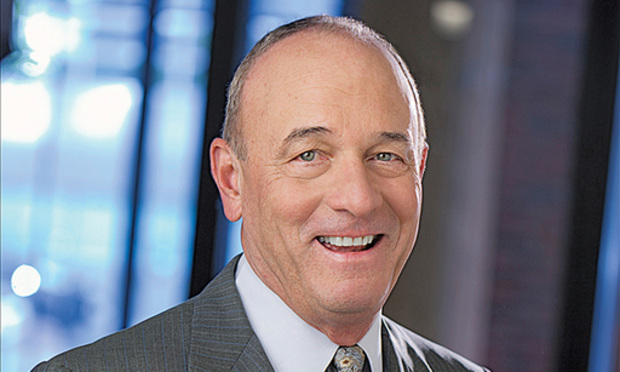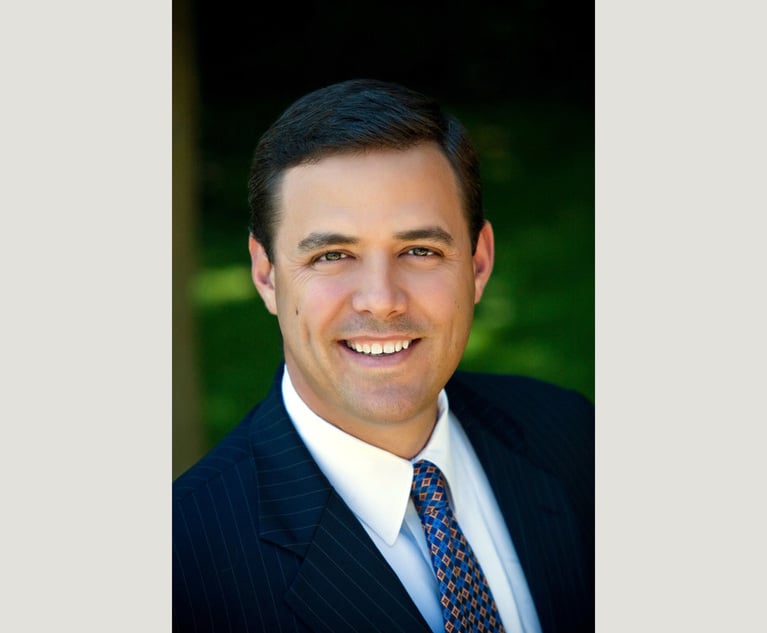Giant Slayer: John Keker, Keker, Van Nest & Peters
Keker won a nationwide injunction blocking the president's executive order which threatened to strip federal funding from local governments across the country deemed “sanctuary jurisdictions.”
November 14, 2017 at 01:40 PM
10 minute read

John Keker and his team at Keker, Van Nest & Peters kicked into action quickly after President Donald Trump signed an executive order in January threatening to strip federal funding from about 300 communities across the country which decline to cooperate with federal immigration officials. In an recent interview with The Recorder, Keker said Trump's sanctuary city order was “the most unconstitutional thing that I could imagine, and we jumped on it.”
Working pro bono on behalf of Santa Clara County, the Keker team filed suit on the heels of another filed by San Francisco, and upped the ante by asking for the nationwide injunction. In April U.S. District Judge William Orrick III issued a nationwide injunction barring the Trump administration. Keker recently spoke with The Recorder about the unique nature of the case and why the firm thought it was an important pro bono effort to take on. What follows has been edited for length and clarity.
What does this case show us about the firm's litigation capacities? Santa Clara v. Trump was easy [compared to our big trial wins] because the sanctuary cities order that the Trump administration put out was the most unconstitutional thing that I could imagine, and we jumped on it. There was a lot of enthusiasm from lawyers here to point out the serious unconstitutional nature of it, and Judge Orrick didn't take much time to decide that we were right and the administration was wrong.
You might be down-selling the impact though. You're talking about a nationwide injunction which had an affect across the country. Well I think it had a huge impact on the administration. It sort of shut the administration up over things that it wanted to do that weren't constitutional, and made them stop and think and recognize the adverse publicity they were going to get if they kept doing these stupid things that weren't going to stand up in court. And it also gave us a chance to let the judiciary be [the] third branch and do what it's supposed to do.
Why was this case an important one for the firm to take on? It was important because we believed in the merits of the case. The idea—that the president of the United States would intervene and take on unconstitutional powers to say, “I'm going to cut federal funding for this, that, and the other,” when it was clear that that was not his role, it was Congress'—that was important.
But I think more importantly, this firm has been very concerned about immigration policies. We've had a huge pro bono program to represent kids who were being sent back without counsel, without any kind of protection. There are just a lot of people in this firm that care about immigration reform. The sanctuary cities order was so anathema to that there was huge support in the firm. When the travel ban first came out lots of people in this firm were down at the airport holding up signs that said, “I'm a lawyer if you need help.” So ideologically and practically, that was an important case to us.
What are the unique challenges of litigating against the Trump administration? Well, unique is when you sue the president of the United States, you're really taking on something. Fortunately, this president has made it easy. He overreaches so much. He so violated, in this instance, the balance of powers that we thought we had a good shot. What was difficult about it was that the administration was also inconsistent.
They came into court and their argument basically was “No, no, no. Don't read what we said. Don't read what's in the order. This is what we meant. And please, judge, please listen to what we say now, which is something completely different than what is written down.” Which is very annoying to me. And then Attorney General Sessions came out and said, “This is how we're going to interpret the order,” which was fairly offensive. And it was very offensive to Judge Orrick, too. They came in and said, “Judge Orrick, you spent so much time reading our executive order. That's not what it means. It means something entirely different.”
It has to keep you on your toes at oral argument though, because it's a shifting target, right? That's what Judge Orrick was saying. Judge Orrick was saying, “C'mon guys. I can read the words. They're perfectly clear. And now you, as a representative of the Justice Department, are coming in and saying because I'm a mere federal district judge I should listen to you telling me that it means something different.” I don't know if that was a challenge, but it was really annoying.

John Keker and his team at
Working pro bono on behalf of Santa Clara County, the Keker team filed suit on the heels of another filed by San Francisco, and upped the ante by asking for the nationwide injunction. In April U.S. District Judge William Orrick III issued a nationwide injunction barring the Trump administration. Keker recently spoke with The Recorder about the unique nature of the case and why the firm thought it was an important pro bono effort to take on. What follows has been edited for length and clarity.
What does this case show us about the firm's litigation capacities? Santa Clara v. Trump was easy [compared to our big trial wins] because the sanctuary cities order that the Trump administration put out was the most unconstitutional thing that I could imagine, and we jumped on it. There was a lot of enthusiasm from lawyers here to point out the serious unconstitutional nature of it, and Judge Orrick didn't take much time to decide that we were right and the administration was wrong.
You might be down-selling the impact though. You're talking about a nationwide injunction which had an affect across the country. Well I think it had a huge impact on the administration. It sort of shut the administration up over things that it wanted to do that weren't constitutional, and made them stop and think and recognize the adverse publicity they were going to get if they kept doing these stupid things that weren't going to stand up in court. And it also gave us a chance to let the judiciary be [the] third branch and do what it's supposed to do.
Why was this case an important one for the firm to take on? It was important because we believed in the merits of the case. The idea—that the president of the United States would intervene and take on unconstitutional powers to say, “I'm going to cut federal funding for this, that, and the other,” when it was clear that that was not his role, it was Congress'—that was important.
But I think more importantly, this firm has been very concerned about immigration policies. We've had a huge pro bono program to represent kids who were being sent back without counsel, without any kind of protection. There are just a lot of people in this firm that care about immigration reform. The sanctuary cities order was so anathema to that there was huge support in the firm. When the travel ban first came out lots of people in this firm were down at the airport holding up signs that said, “I'm a lawyer if you need help.” So ideologically and practically, that was an important case to us.
What are the unique challenges of litigating against the Trump administration? Well, unique is when you sue the president of the United States, you're really taking on something. Fortunately, this president has made it easy. He overreaches so much. He so violated, in this instance, the balance of powers that we thought we had a good shot. What was difficult about it was that the administration was also inconsistent.
They came into court and their argument basically was “No, no, no. Don't read what we said. Don't read what's in the order. This is what we meant. And please, judge, please listen to what we say now, which is something completely different than what is written down.” Which is very annoying to me. And then Attorney General Sessions came out and said, “This is how we're going to interpret the order,” which was fairly offensive. And it was very offensive to Judge Orrick, too. They came in and said, “Judge Orrick, you spent so much time reading our executive order. That's not what it means. It means something entirely different.”
It has to keep you on your toes at oral argument though, because it's a shifting target, right? That's what Judge Orrick was saying. Judge Orrick was saying, “C'mon guys. I can read the words. They're perfectly clear. And now you, as a representative of the Justice Department, are coming in and saying because I'm a mere federal district judge I should listen to you telling me that it means something different.” I don't know if that was a challenge, but it was really annoying.
This content has been archived. It is available through our partners, LexisNexis® and Bloomberg Law.
To view this content, please continue to their sites.
Not a Lexis Subscriber?
Subscribe Now
Not a Bloomberg Law Subscriber?
Subscribe Now
NOT FOR REPRINT
© 2025 ALM Global, LLC, All Rights Reserved. Request academic re-use from www.copyright.com. All other uses, submit a request to [email protected]. For more information visit Asset & Logo Licensing.
You Might Like
View All
How I Made Office Managing Partner: 'Stay Focused on Building Strong Relationships,' Says Joseph Yaffe of Skadden

US Patent Innovators Can Look to International Trade Commission Enforcement for Protection, IP Lawyers Say

How the Deal Got Done: Sidley Austin and NWSL Angel City Football Club/Iger

How Uncertainty in College Athletics Compensation Could Drive Lawsuits in 2025
Trending Stories
- 1Critical Mass With Law.com’s Amanda Bronstad: LA Judge Orders Edison to Preserve Wildfire Evidence, Is Kline & Specter Fight With Thomas Bosworth Finally Over?
- 2What Businesses Need to Know About Anticipated FTC Leadership Changes
- 3Federal Court Considers Blurry Lines Between Artist's Consultant and Business Manager
- 4US Judge Cannon Blocks DOJ From Releasing Final Report in Trump Documents Probe
- 5White & Case KOs Claims Against Voltage Inc. in Solar Companies' Trade Dispute
Who Got The Work
J. Brugh Lower of Gibbons has entered an appearance for industrial equipment supplier Devco Corporation in a pending trademark infringement lawsuit. The suit, accusing the defendant of selling knock-off Graco products, was filed Dec. 18 in New Jersey District Court by Rivkin Radler on behalf of Graco Inc. and Graco Minnesota. The case, assigned to U.S. District Judge Zahid N. Quraishi, is 3:24-cv-11294, Graco Inc. et al v. Devco Corporation.
Who Got The Work
Rebecca Maller-Stein and Kent A. Yalowitz of Arnold & Porter Kaye Scholer have entered their appearances for Hanaco Venture Capital and its executives, Lior Prosor and David Frankel, in a pending securities lawsuit. The action, filed on Dec. 24 in New York Southern District Court by Zell, Aron & Co. on behalf of Goldeneye Advisors, accuses the defendants of negligently and fraudulently managing the plaintiff's $1 million investment. The case, assigned to U.S. District Judge Vernon S. Broderick, is 1:24-cv-09918, Goldeneye Advisors, LLC v. Hanaco Venture Capital, Ltd. et al.
Who Got The Work
Attorneys from A&O Shearman has stepped in as defense counsel for Toronto-Dominion Bank and other defendants in a pending securities class action. The suit, filed Dec. 11 in New York Southern District Court by Bleichmar Fonti & Auld, accuses the defendants of concealing the bank's 'pervasive' deficiencies in regards to its compliance with the Bank Secrecy Act and the quality of its anti-money laundering controls. The case, assigned to U.S. District Judge Arun Subramanian, is 1:24-cv-09445, Gonzalez v. The Toronto-Dominion Bank et al.
Who Got The Work
Crown Castle International, a Pennsylvania company providing shared communications infrastructure, has turned to Luke D. Wolf of Gordon Rees Scully Mansukhani to fend off a pending breach-of-contract lawsuit. The court action, filed Nov. 25 in Michigan Eastern District Court by Hooper Hathaway PC on behalf of The Town Residences LLC, accuses Crown Castle of failing to transfer approximately $30,000 in utility payments from T-Mobile in breach of a roof-top lease and assignment agreement. The case, assigned to U.S. District Judge Susan K. Declercq, is 2:24-cv-13131, The Town Residences LLC v. T-Mobile US, Inc. et al.
Who Got The Work
Wilfred P. Coronato and Daniel M. Schwartz of McCarter & English have stepped in as defense counsel to Electrolux Home Products Inc. in a pending product liability lawsuit. The court action, filed Nov. 26 in New York Eastern District Court by Poulos Lopiccolo PC and Nagel Rice LLP on behalf of David Stern, alleges that the defendant's refrigerators’ drawers and shelving repeatedly break and fall apart within months after purchase. The case, assigned to U.S. District Judge Joan M. Azrack, is 2:24-cv-08204, Stern v. Electrolux Home Products, Inc.
Featured Firms
Law Offices of Gary Martin Hays & Associates, P.C.
(470) 294-1674
Law Offices of Mark E. Salomone
(857) 444-6468
Smith & Hassler
(713) 739-1250






